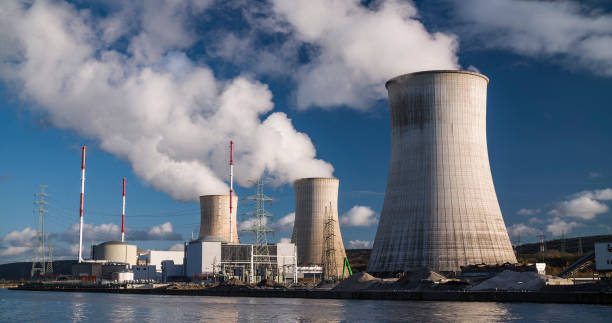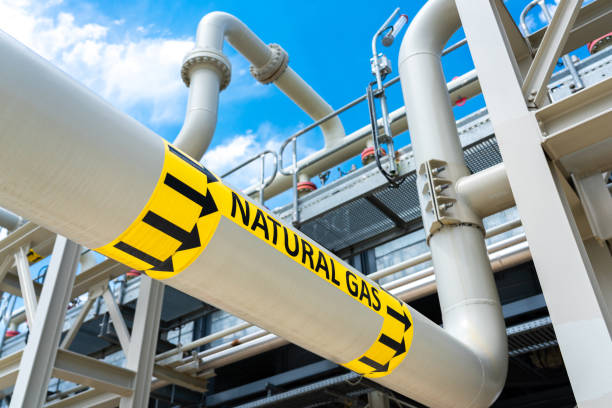
Nuclear energy is present in the nucleus of an atom, the tiny particles that make up all the particles of the universe. The energy that is present holds the nucleus together, and this energy is released from the nucleus when it is split into several parts. Nuclear energy is released from the nucleus by fission and fusion reactions. Nuclear fission is a process in which an atom is divided into smaller particles and releases energy. Nuclear fusion is a process in which two or more smaller nuclei combine to form a larger nucleus.
The nuclear energy that is released from the nuclear fusion reaction is much greater than the nuclear fission reaction. The intensity of nuclear energy from fusion reactions is so high that these cannot take place on Earth because of the extreme conditions it requires. The fusion reaction occurs naturally in the sun because of the immense gravity that creates the conditions to generate fusion. The nuclear fission reactions are usually introduced in the radioactive plants, and the energy released from these reactions is harnessed all over the world for different purposes by a process of nuclear fission, and it is used in the generation of electricity.
Nuclear energy is released from the process of nuclear fission; nuclear power plants utilise the isotopes of radioactive elements, mostly uranium, as it is easy to split. The nuclear fuel and conditions when provided to the radioactive elements break down into small pieces and start a chain reaction that releases heat, radiation and radioactive waste. The energy from nuclear energy is utilised in various processes, but the chain reactions that go uncontrolled release so much heat that it has the potential to melt the reactor.
Nuclear energy offers lots of benefits, among which the five main benefits of nuclear energy are discussed below.
1- Generation of electricity.
2- Reliable low-carbon source.
3- High energy efficiency.
4- Affordability.
5- Climate sustainability.
Nuclear energy offers lots of benefits, among which the five main benefits of nuclear energy are discussed below.
The nuclear energy from the nuclear reactors is utilised to produce electricity in the same way as other power plants. The other plants mostly run on non-renewable energy, but nuclear energy breaks down the uranium and utilises its energy to generate electricity. The electricity that comes from nuclear energy can be utilised in other industries and chemical processes. The fossil fuels have a limited lifespan than a uranium reserve that is estimated to last for a longer time span. Compared to other electricity generation methods, it is a clean source of electricity as it produces emission-free electricity.
Nuclear energy is a reliable source of energy, as nuclear material uranium is a raw material that is widely available. That’s why it is a long-term and low-carbon emission process, and it is not dependent on the different conditions, like wind and solar are dependent on the weather. Nuclear energy is a great solution for generating power at a large scale, along with the maintenance and sustainability of the environment. The nuclear energy resources do not have any constraints, and it is unaffected by the climate; that is why it is a steady and reliable source and gives the highest average of reliable low-carbon sources.
The nuclear fuel has an exceptionally high energy density, as a little amount of radioactive material is used to produce high energy. One kg of uranium releases an energy almost twenty thousand times more than the energy that is released from one kg of coal. This energy-efficient property of the uranium helps in reducing the frequency and volume of fuel sourcing as compared to fuel from fossils. The amount of fuel that is used in a nuclear plant is also less compared to the fuel used in other power plants because the energy released in the nuclear fission reaction is almost ten million times more than burning fossil fuel.
Nuclear energy is a cost-effective source as advances in small modular reactors are built in a factory, and these are shipped by road, resulting in reduced work on-site and results in better cost predictability. The cost of nuclear energy is mostly based on the cost of uranium, as it is a raw material and is abundantly present in some areas. That’s why its cost is less than the energy from fossil fuel. The nuclear plants have a large operational time and require low maintenance, that is why the electricity produced by them is relatively low in cost. The combination of an increased average life cycle, low operating costs makes nuclear energy an affordable source.
Nuclear energy plays a crucial role in achieving sustainability and net-zero greenhouse gas emissions. Nuclear energy is a key to achieving net zero and sustaining the climate, as fossil fuels are one of the main reasons for climate change and global warming. The use of nuclear energy with full potential reduces the need for these resources and promotes the clean energy transition. According to some sources, it is reported that nuclear power produces clean air energy compared to other sources.
Along with the advantages, the understanding of the disadvantages of nuclear energy is also essential. The five main disadvantages of nuclear energy are discussed below.
The major concern and disadvantage of using nuclear energy is the nuclear waste management, because it is a difficult process and remains hazardous for a very long time. The radioactive waste is highly toxic and has a negative impact on the health of humans, the agricultural landscape and the whole ecosystem. The safe handling of the waste material is required, as even a little breach or accident leads to extremely hazardous conditions. Although the small amount of radiation is not harmful, the waste from the radioactive emissions emits harmful radiation. The leftover radioactive particles from the mining of uranium also became a threat to the environment.
Nuclear accidents are the biggest threat because the historical accidents of nuclear power plants show the disastrous effects of such incidents. The nuclear disaster reported in Fukushima, Japan, in 2011 resulted in severe loss of life, as 150,000 people were evacuated. The Chernobyl incident of a nuclear power plant in the year 1986 shows how harmful these accidents can be, as radiation is still active at the location of nuclear accidents. The nuclear disasters cause serious destruction, and, in any circumstance, no one wants to experience that again.
Nuclear proliferation is also a major concern; the spread of nuclear weapons and technology can ruin the peace of the world. The energy that is used to make a fuel for power plants can be used to produce the explosive material for nuclear weapons. Many countries have secret nuclear weapons programs instead of utilising this energy for its benefits and environmental sustainability. The presence of the nuclear weapons results in intensifying the regional and conventional conflicts into the nuclear war that will lead to a disastrous exchange between the nuclear exchange.
The nuclear power plants are reducing the security of the country because in terrorist operations, these plants are the main target of these attacks. The terrorist attack on these plants can cause major explosions and put the population at risk. The dangerous, harmful material that is generated can affect the environment and the surrounding region, and the impact of these can be felt even after generations. Along with that the economy of the nation is also affected as it takes a large time span to build and has a high upfront cost.
Nuclear power plants use a large amount of water for cooling a nuclear plant. The release of hot water increases the temperature of local water, which has an impact on the local ecosystem. The aquatic wildlife is impacting the local community living near the nuclear power plant. The change in climate causes the shortage of water that is an essential part of the cooling system of nuclear power plants, so without water, they cannot be cooled. The people living near the nuclear plant are reported to have a high number of diseases because of the exposure to the radiation more than the normal.
In terms of sustainability, nuclear is an effective way of producing energy as it is a zero-emission source. The power that is generated during the process of fusion is used to produce the energy, while the heat released can create a system that is able to generate electricity by spinning turbines. Global warming is increasing because of the greenhouse gases released because of fossil fuel burning, and the harmful effects on the health of humans are also happening. Nuclear energy keeps the air free from those toxins that contribute to global warming. The land footprint of nuclear energy is also less compared to other energy-generating sources.
In the bottom line, nuclear energy offers a lot of benefits, but it comes with serious concerns. It is sustainable for the environment, as the current concerns of the world are climate change, and nuclear energy provides sustainability to the environment. It is zero-carbon emission-based energy that provides economic stability to the country once it is built, as the maintenance cost of nuclear power is less so a nation can take benefits from it for a long time. It is affordable and generates a large amount of energy from electricity without harmful emissions.
The reliance on nuclear power can reduce the nation’s dependence on other countries for energy resources. Despite the efficient benefits of nuclear energy, the disadvantages it has make it a contentious option over the other. It is not a renewable energy source as it does not have an infinite raw material resource. The history of nuclear energy is catastrophic; it cannot be dealt with again, as the consequences of the misuse of this power are still showing. Nuclear proliferation is the biggest threat that is increasing constantly, as it can intensify the minor disputes. Balancing the advantages and disadvantages of nuclear power is essential for innovation.

This post has been authored and published by one of our premium contributors, who are experts in their fields. They bring high-quality, well-researched content that adds significant value to our platform.


